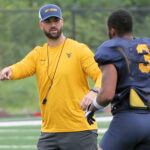WVU getting prepared for calling tempo offense, even with sign stealers
MORGANTOWN — The whole offseason, the talk around Rich Rodriguez’s offense has been about tempo. The famous “spot the ball,” saying is back. Rodriguez’s offense is going to be moving out there.
Over the past couple of weeks and in the spring, the players and coaching staff discussed how they’ve adjusted to the tempo, whether that’s through getting in better shape and simplifying the playbook.
There hasn’t been too much discussion on how Rodriguez will actually call the tempo offense. Usually, a coach calls in the play from the sideline, and then the quarterback relays the play to the rest of the offense in the huddle, but the biggest part of the tempo offense is running it without a huddle.
Last year, the tempo offense received a buff, allowing for offensive players to have helmet communication up to 15 seconds left remaining in the play clock. Most of the time, the offensive coordinator is in the helmet, but Rodriguez is the playcaller. The closest thing to an OC is offensive assistant Travis Trickett, but he won’t be in the helmet either. Quarterbacks coach Rhett Rodriguez will be in the ear of quarterbacks.
WVU has been using the in-ear communication every day at practice with all the quarterbacks.
“I probably should be on it,” Rodriguez said. “I probably wouldn’t have to yell as much. I have out-of-helmet communication. [Rhett] has in helmet communication. Perfect for his personality. I have out-of-helmet communication, which is perfect for mine. I just yell… I won’t use that during games. I’ll be screaming this or thinking this. Rhett’s the calm measured guy, telling them the coverage.”
On the defensive side, defensive coordinator Zac Alley said he’s been working with the linebackers on the in-helmet communication. Alley said he won’t use the in-ear communication to call plays, though. He’ll use it to give the linebacker tips and make sure all the players are lined up right.
“I’ve got quite a few of the backers in them in practice, just so they get used to hearing me in their head,” Alley said. “So if they have to go in the game and do it, it’s not the first time they’ve heard me yelling at them before the snap. I’ll communicate with them out there. I try and help them with things I’m seeing.”
Recently, the NCAA fined Michigan $20 million for the sign-stealing case, along with suspending head coach Sherrone Moore for another game, totaling up to three games in 2025. If you watched the Netflix documentary Untold: Sign Stealer about Connor Stalions, you’ll have seen the lengths certain schools go to steal signs. It’s not easy, but definitely possible.
Rodriguez’s main method of running the tempo offense is through hand signals on the sideline. Since Michigan didn’t receive too big a punishment, teams are still going to figure out signs.
Rodriguez is prepared.
“We change our signals up,” Rodriguez said. “We change who the guy is signaling. We got a variety of different signals that we can do for the same play. If it were a Michigan situation, we’d be ready.”
Rodriguez and staff have been simulating what will happen during gamedays. They’ve even been using the tablets during practice, like they’ll use. The only thing they haven’t done is put the coaches up in the box. That’s the only step their missing, and will do it Friday.
“We work on it every day, Rodriguez said. “Friday, I’ll have it just like the game where the coaches are in the box, and the other coaches are on the field.”


